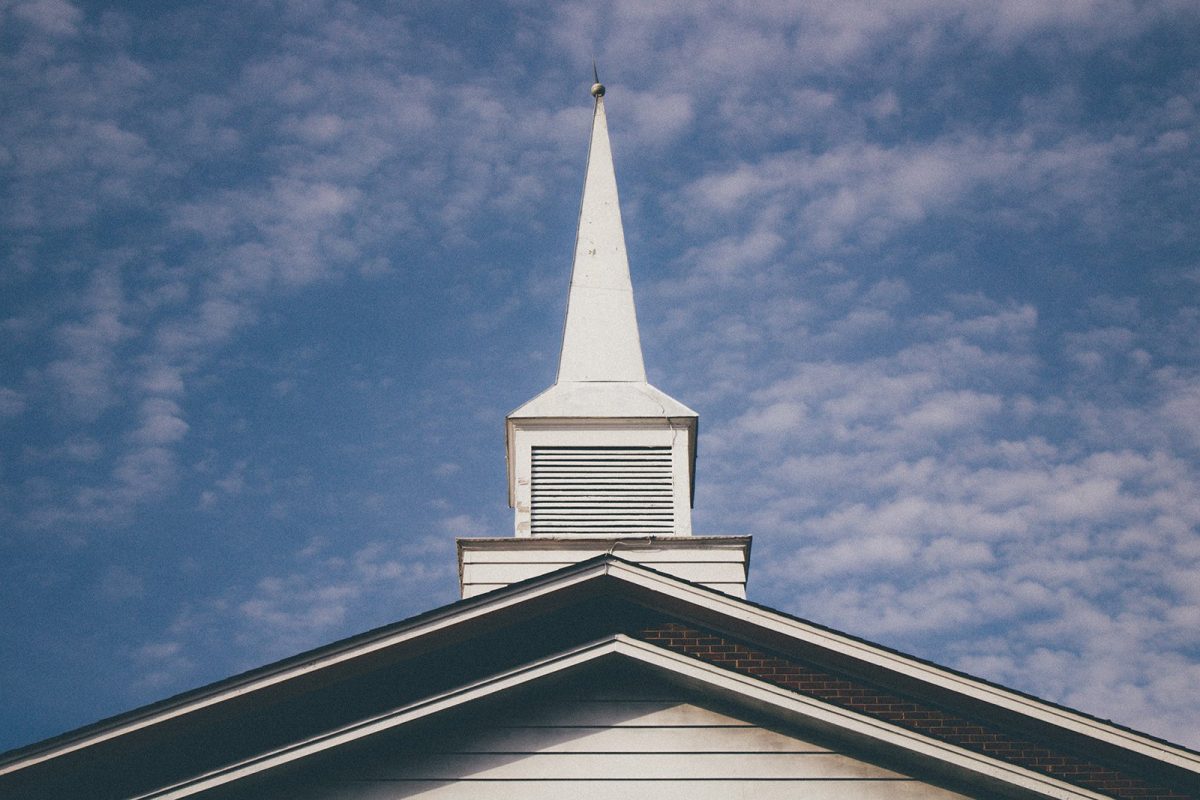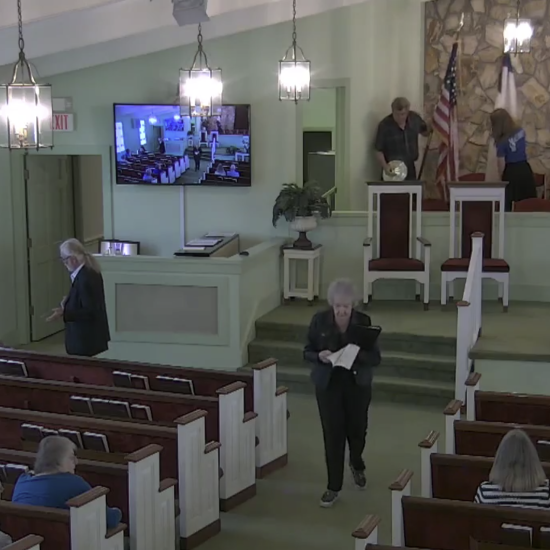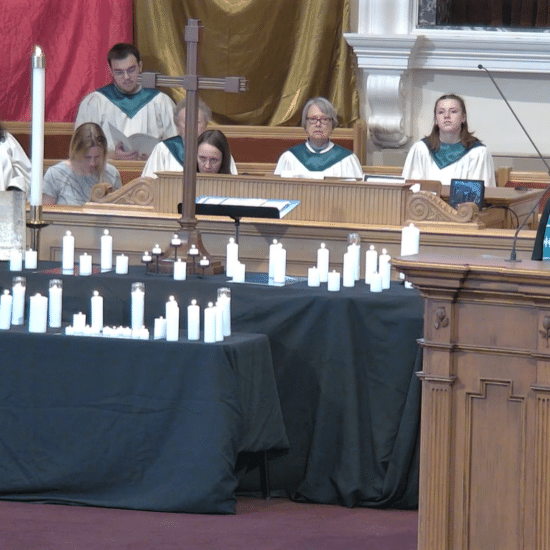
(RNS) — The Baptist church I attended with my family as a girl in The Middle of Nowhere, Maine, was a one-room affair. The old clapboard building had no running water and — until we raised enough funds for an addition — no bathroom but the outhouse at the back corner. An old hitching post rose from the ground next to the granite front steps, a reminder of congregants long ago who once traveled on horseback to worship.
A tiny vestibule opened into an airy sanctuary, filled to the brim with three sections of white wooden pews. Two side aisles led to the platform where the altar stood sentinel in front of a rustic maple Communion table.
As a young girl, I spent many a Sunday service fretting about being married in that church someday. Every wedding I’d ever read about or watched on television depicted the bride walking gracefully down a middle aisle, straight toward the altar, pews on either side evenly surrounding her like the parted waves of the Red Sea.
How could I get married in a church with no middle aisle? This was my inordinate worry.
Our pastor, Vern, was a big man. His presence flowed off the platform all the way down to the front pews where I sat with my family. When Vern led the hymns with his deep, baritone voice, the floor would rumble as he stood firmly on one foot and stamped the other in time, especially so when we sang his favorite song, “I’ve Got a Mansion”:
I’m satisfied with just a cottage below. A little silver and a little gold. But in that city where the ransomed will shine, I want a gold one that’s silver lined!
When we would get to the last round of the chorus, repeating it several times, I could see sometimes his eyes glistened with tears as he pumped his foot even harder:
I’ve got a mansion just over the hilltop. In that bright land where we’ll never grow old. And some day yonder we will never more wander. But walk on streets that are purest gold!

(Joshua Rodriguez/Unsplash)
Does this all ring nostalgic? Perhaps so. But I paint this picture — not out of some Thomas Kinkade kink — but rather in an attempt to explain why I’m still here. Still in the church. Still part of the bride — even if the reality of life in the church hasn’t quite met up to my youthful idealism.
Far from it, in fact.
Consider, for example, the countless instances of sexual abuse and cover-ups by pastors that have taken place, not only across denominations, but particularly in my own Southern Baptist Convention. Numerous church leaders have been removed because of “moral failings” — and even more should have been.
This is not merely headline news: I was deeply and personally devastated to invest decades of my life in a Christian institution only to discover it was led by a man leading a double life of sexual perversion and self-dealing.
This betrayal merely compounded my bewilderment over the past few years in watching leaders I once respected and principles I still believe in being co-opted and distorted in the name of political power and expediency. The relativism and rejection of absolutes I was warned to resist in the world have come to the church — and nothing prepared me for this.
And yet, I am part of this.
I have wept these past days, weeks, and months. I have felt the truth of Jesus’s words in the Gospel of Matthew, pronouncing woe upon “the cities where most of his mighty works had been done, because they did not repent.”
Woe to us, indeed.
Yet, Jesus’s invitation still stands, offered in the verses that immediately follow his words of judgment: “Come to me, all you who are weary and burdened, and I will give you rest. Take my yoke upon you and learn from me, for I am gentle and humble in heart, and you will find rest for your souls.”
Over the past few years, in the midst of the turmoil the church and the country are enduring, I have received countless messages of pain and lament from fellow evangelicals (and especially Baptists), asking me what to do, where to go, whether to stay in the church or to leave.
I understand many have been hurt or betrayed by the institutional church. And while my wounds are not as deep as those of so many, I now count myself among them. I don’t always know what to say to people in their pain. But one thing I do know to say is, “The bride of Christ needs you. Don’t abandon her to those who exploit and abuse her. Christ loves his bride too much for us to let her go.”
My childhood church has come to mind a lot lately, perhaps because these days in church life have so dismayed and disoriented me. I smile now at my long ago worries about the aesthetics of my someday wedding. Yet, when I reflect a bit more, I see now below the surface-level worry was something deeper: a young, innocent and earnest believer who simply couldn’t imagine a future apart from her church.
I still can’t.
But I know better now what that future looks like, what it means to be a part of the church, not merely a daydreamer in the pew. I realize while churches are led by fallen humans, Christ is the true Shepherd, my real Groom.
Yes, the bride of Christ — the church — is seared, spotted, smudged and smeared.
Yet even so.
The gentle and humble can still be found.
Like Pastor Vern. And like countless other pastors, missionaries, teachers and servants who spend hidden lives of no name or repute, toiling for God’s kingdom in The Middle of Nowhere, day in and day out. Who preach the Word on Sunday and deliver the mail Monday through Saturday.
Who drive long country miles to bring meals to the sick and lonely. Who cut out construction paper hearts for toddler hands to cover with glue and glitter. Who pore over obscure footnotes in search of deeper understanding.
Who shoulder the cries of confession for those who’ve gone astray. Who shoulder the tears of torment for those who’ve been abused. Who don’t headline conferences, or sell books they’ve not written under their name, or tweet their way to feeble fame. Who love because they were first loved.
The eyes of these are on the coming perfection, the future glory, the feast that is still being prepared. From either side, or maybe the middle, they walk down the aisles. Because they see only the Groom, they are moving toward him, their feet firmly placed on this present ground, gently tapping out the time.
Karen Swallow Prior, Ph.D., is Research Professor of English and Christianity and Culture at Southeastern Baptist Theological Seminary. She is the author of several books, including On Reading Well: Finding the Good Life through Great Books.






